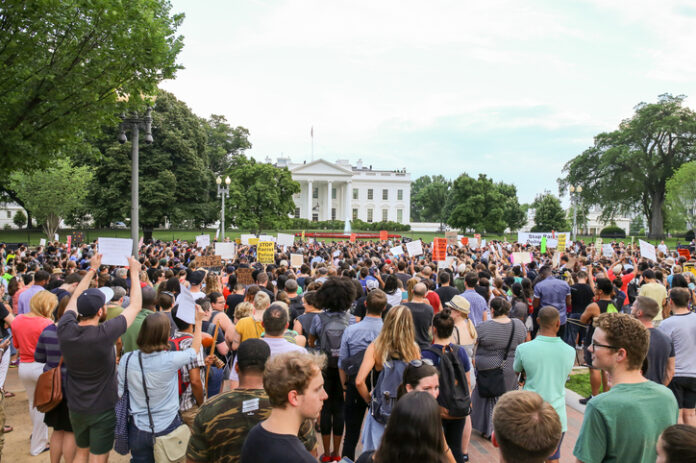Science and medicine have long been considered off-limits for political debate, but with increasing tensions over pandemic lockdown measures, race relations, and the presidential election, health care professionals and their organizations have visibly joined the fray.
During the pandemic, doctors and nurses joined a campaign called “Stay Home: Stay Safe,” in which they publicly showed their image on the streets and in social media campaigns. In some cases, health care professionals confronted people for protesting lockdown orders.
When racial tensions heated up in the wake of George Floyd’s death at the hands of a police officer, governments and health care professionals set aside pandemic concerns and social distancing for this one purpose. Instead of “stay home, stay safe,” health care workers clad in scrubs high-fived protestors making their way past hospitals.
Others, such as the group White Coats for Black Lives, paused for “unity breaks” on hospital grounds to show solidarity with protestors. Still others held “die-ins” where staff laid on their chests for 8 minutes and 46 seconds, the length of time the Minnesota officer pinned George Floyd to the ground.
An open letter signed by more than 1,200 medical professionals stated the BLM protests require a “wholly different” response from those against lockdowns and urged that protests for George Floyd not be disbanded “under the guise” of COVID-19 concerns.
Political Issues as ‘Health’ Issues
In Michigan, the Genesee County Board of Commissioners voted to declare disparities in health care as “racism” and called for a review of health department policies on “racial equity.” Two commissioners complained the resolution was rushed through with no time for questions.
The American Hospital Association expressed a similar sentiment, stating minorities had been “disproportionately affected” by the pandemic and resolving to address “racial, ethnic, and cultural inequities, including those in health care, that are everyday realities for far too many individuals.”
The exam room is an attractive platform for political activism, says Sally Pipes, president and CEO of the Pacific Research Institute.
“Health care is the one public policy issue that affects every single American,” said Pipes. “As a result, it’s also the easiest issue to politicize.”
It is admirable that doctors and nurses are fighting for a cause, says Anthony Fappiano, a third-year medical student at the New England School of Osteopathic Medicine.
“My criticism is, in my experience they aren’t fully educated on all the factors involved,” said Fappiano. “We can see this with the lockdowns, as an example. The doctor and nursing groups are all in favor of shutting everything down because they don’t want to be overwhelmed. But that is a narrow-minded viewpoint because it ignores the economic impact, the psychological impact, etc.
“Their viewpoint is shrouded by the fact that they are the ones dealing with these patients,” Fappiano said. “That’s understandable, but that’s also what they signed up for.”
Racism or Disparities?
Not all health care professionals agree disparities in health care are the result of “systematic racism,” the notion that institutions put some groups at a disadvantage because of race. The notion that bigotry, hatred, and racism run rampant in health care is an insult to the millions of health care workers who do their best to help all people, says Fappiano.
“I have worked in the health care field since I was 15 in different locations and positions and have never seen a single incident of systemic racism,” said Fappiano. “There are individuals who are racist, including patients who make racist comments towards medical staff, but I have never seen a patient treated differently because of their race or ethnicity.”
It is unscientific to assume disparate outcomes are caused by racism, says Chad Savage, M.D., founder of YourChoice Direct Care and a policy advisor to The Heartland Institute, which publishes Health Care News.
“Though racism and discrimination could play a role in racially based differences in diseases such as susceptibility to COVID-19, basing all conclusions on this presumption may blind researchers to other possible attributions of these differences,” said Savage.
Freedom to Reform
A better way to address disparities in health care is to give people more freedom, says Fappiano.
“Whether you believe in systemic racism in our health care system or not, the best way to fix it is to release health care from the grip of the government and large accreditation agencies,” said Fappiano.
Removing barriers to allow different levels of providers at different price points would help solve health care access problems, says Fappiano.
“We could get effective health care into the low-income neighborhoods that desperately need them,” said Fappiano
Madeline Peltzer (mpeltzer@hillsdale.edu) writes from Hillsdale, Michigan.



















